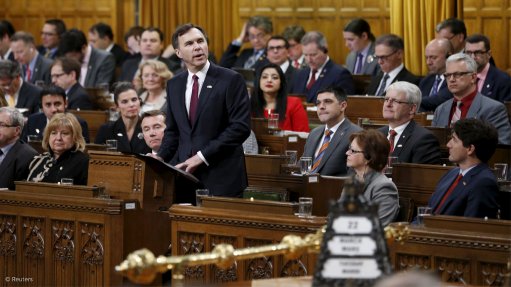
Canada's Finance Minister Bill Morneau delivers the 2016 federal budget in the House of Commons on Parliament Hill, in Ottawa.
Photo by: Reuters
TORONTO (miningweekly.com) – Canada’s federal government has extended the 15% Mineral Exploration Tax Credit (METC) until March 2017, turning a deaf ear to lobby groups calling for increased benefits that could help resuscitate the struggling domestic exploration industry and enhance the capital flow to these important firms.
The METC helped junior mineral exploration companies raise capital by providing an incentive to individual investors in flow-through shares issued to finance ‘grassroots’ mineral exploration. This credit was in addition to the deduction provided to the investor for the exploration expenses ‘flowed through’ from the company that issued the shares.
“Given this challenging time for junior mining companies, the government proposes to support their mineral exploration efforts by extending the credit for an additional year,” budget documents advised.
The METC was scheduled to expire on March 31 under the previous budget.
The federal government advised that it estimated this measure to result in a net reduction in federal revenues of C$20-million over the 2016/17 to 2017/18 period, in a Liberal government budget that projected a C$29.4-billion deficit.
The flow-through structure had been entrenched in the Canadian tax code since the late 1980s, but had existed in Canada in other iterations since the 1950s.
Under Canada’s Income Tax Act, there were two types of flow-through share investments – ‘regular,’ which entailed a 100% deduction write-off for exploration expenses (net of federal and provincial credits) and ‘super,’ which was similar, but added an additional 15% federal tax credit for grassroots exploration, as well as provincial and territorial deductions and tax credits.
Canadian rules required a company that was renouncing, or flowing through, an exploration expense to an investor, to get out in the field and spend those exploration dollars within 24 months and, in certain circumstances, forcing exploration companies to get to work in the quickest timeframe.
The Prospectors and Developers Association of Canada (PDAC), which represented more than 1 000 corporate members, including senior, midsize and junior mining companies and organisations, providing services to the mineral industry, had recently lobbied the federal government during its nationwide prebudget consultations to take action and improve the flow of capital to the junior exploration sector, as well as to address the infrastructure deficit in northern and remote Canada.
"PDAC is pleased with a number of initiatives included in Budget 2016 that will support Canada's mineral exploration and development sector. The budget adopts a holistic approach to resource development, with support for innovation, financing, Aboriginal and community consultation and northern economic development," new PDAC president Bob Schafer stated.
The PDAC also welcomed the commitment to proceed with measures to ensure that costs associated with environmental studies and community consultations would be considered as Canadian Exploration Expenses; something the PDAC had advocated since 2013.
The federal budget also included C$1-billion over four years to support clean technology development in industries including mining, as well as $120-billion dollars over ten years for infrastructure investment.
Further, as part of the federal infrastructure initiative to encourage investment in modernising, greening and increasing the capabilities of federal science, research and innovation facilities, Natural Resources Canada would receive C$87.2-million for projects across the country that supported research in forestry, mining and minerals, earth sciences and mapping, as well as innovation in energy technology.